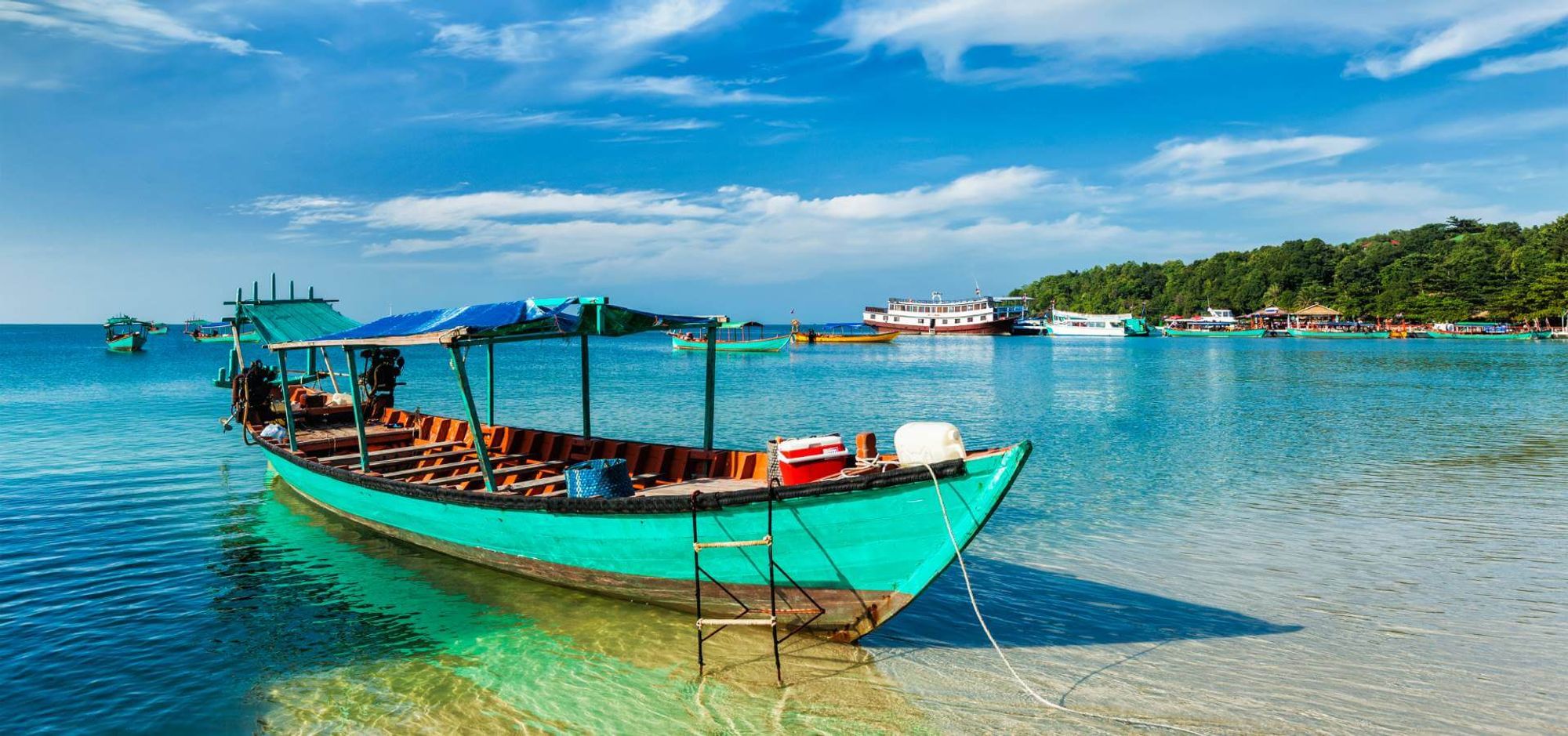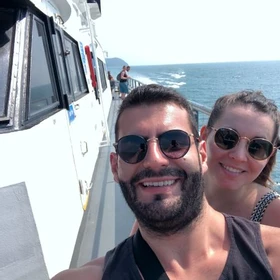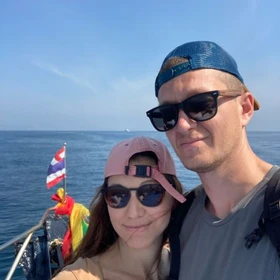Koh Rong Samloem to Sihanoukville Trip Overview
Distance 21 km (13.1 miles) | |
Price range US$ 13-US$ 14 | |
Ride Duration Range 30m-45m | |
Earliest Departure 23:30 | |
Latest Departure 23:30 | |
Most Popular Operator |
Find up-to-date information on departure times, schedules, and prices so you can easily compare and book your tickets.
Taking a bus from Koh Rong Samloem to Sihanoukville

How to get from Koh Rong Samloem to Sihanoukville?
Located a short 24 km (15 miles) away, the only way to travel from Koh Rong Samloem to Sihanoukville is through one of the many ferries that ply the route. Multiple companies provide speed boat rides at half-hour or one-hour intervals, and the ride from Koh Rong Samloem to Sihanoukville takes no more than 45 minutes to an hour. With around 21 departures a day, you can pick a time that is most convenient for you. The first boat departs from Koh Rong Samloem to Sihanoukville as early as 6.45 am, and the last one leaves at around 4.45 pm. Most ferries offer multiple pick up points, so it’s best to find out the one closest to your hotel/accommodation.
Travelers can choose between smaller speed boats that have open-air seats and larger high-speed ferries that have indoor seating with air conditioning. The larger boats typically have toilets on board too. Some of them offer complimentary snacks and beverages or have a store where you can purchase something to munch or sip on. Different ferries offer varying luggage allowance limits so do pay attention to these details before you book.
What to see when traveling from Koh Rong Samloem to Sihanoukville?
As you leave from Koh Rong Samloem to Sihanoukville, enjoy serene views of the island’s pristine, soft sand beaches set against a background of swaying palms and thick, green foliage. As your ferry speeds away from the Koh Rong Samloem pier, capture a few Instagram worthy pictures, or sit back and enjoy the cool Gulf of Thailand breeze. Of course, the changing hues of the ocean are also a delight to watch. As you get closer to Sihanoukville, you will notice the Ochheuteal or Serendipity pier, which is the last stop for all ferry boats coming from Koh Rong Samloem. Once your boat docks at the pier, collect your belongings before you carry on with your journey.
What is the best time of the year to visit Koh Rong Samloem?
The island of Koh Rong Samloem is located close to the equator, and blessed with warm temperatures throughout the year. A tropical paradise, Koh Rong Samloem, experiences two distinct seasons - the rainy or monsoon season, and the dry season.
The dry season in Koh Rong Samloem runs from December to March and is also the peak tourist season. During this season, temperatures range from 30°C - 35°C (85°F - 95°F) and are accompanied by clear, blue skies and low humidity levels.
Temperatures in December and January are around 30°C (85°F) with plenty of sunshine, low humidity, and very few rainy days. February starts with similar temperatures, but by the end of the month, thermometer readings are inching towards the mid-90s. The three months from December - February is the best time to visit Koh Rong Samloem. With clear water conditions and warm sea temperatures, it's a great time to go snorkeling or scuba diving. It's also the perfect time to head to Sunset beach to witness one of many glorious sunsets.
March sees temperatures increasing and touching the 35°C (95°F) mark. This trend continues in April and May, making this period the hottest time of the year. Humidity levels also increase during these months, making it seem a lot warmer than it is. The month of May sees a significant jump in the number of rainy days with an average of around 15 wet days per month. Even though there is a 50-50 chance of experiencing rain in May, it is still a reasonably good time to visit the island since showers, though heavy, don't last for very long. Not to mention the fact that accommodations are available at half price and the beaches are empty!
June, July, and August continue to see around 15-17 rainy days with short, heavy showers happening during the day. By the end of August, temperatures start to cool, gradually dropping from 35°C (95°F) to around 27°C (80°F). With pleasant temperatures, it's an excellent time to hike up to the Samloem lighthouse, a 4 hour round trip from Saracen Bay. Climb up to the top of the lighthouse for some stunning views of the island.
September brings in rough weather with longer rain spells that could sometimes last for days. The seas become choppy, and ferry services from Sihanoukville become unpredictable. October is the rainiest month of the year, with more than 20 wet days. Rough seas make swimming, snorkeling and water activities impractical. Rain spells reduce by half in November, and by the end of the month, the weather is dry and warm.
What is the best time of the year to visit Sihanoukville?
Sihanoukville follows a weather pattern similar to Koh Rong Samloem. A popular beach destination, Sihanoukville, sees its peak tourist season from November to February. This period coincides with the dry season that translates to gorgeous blue skies, perfect water conditions and warm temperatures with lower humidity levels than the rest of the year. Average daytime highs range between 30°C - 32°C (86°F - 90°F) and nighttime temperatures are around 20°C - 23°C (68°F - 72°F) With plenty of sunshine hours, it's the perfect time to indulge in water sports, laze around the beach, or even sign up for a Khmer cooking class.
March and April see an uptick in the number of rainy days, but temperatures are warm and toasty with day time highs in the range of 33°C - 34°C (91°F - 93°F). April is the hottest month of the year.
Weather conditions change considerably, come May, with rain expected for around 15 days in the month, signaling the start of the wet season. Humidity levels rise too. It's the start of the off-season period and a good time to visit Sihanoukville if you are looking for bargains, want a quieter vacation, and don't mind the rain. June, July, and August see a similar number of rainy days and rainfall levels.
Temperatures fall by a degree every month, with the average high temperature in August at around 30°C - 31°C (86°F - 88°F). With the tourists gone, it's a great time to head to the popular Otres Beach and experience some beachside bliss without the high season crowds. Rainfall levels continue to rise over the course of the next two months with close to 18-20 wet days. October is the wettest month of the year.
Companies Operating from Koh Rong Samloem to Sihanoukville
Popular stations and stops in Koh Rong Samloem and Sihanoukville
Departure stations in Koh Rong Samloem
Arrival stations in Sihanoukville
Why travel with Bookaway?
Bookaway.com makes it simple and easy to find, compare, and buy city-to-city tickets via bus, train, ferry, and more. We support over 13 languages and 23 currencies worldwide, and we believe that everyone should easily be able to find and purchase what they are looking for. We don’t just want to help you get where you want to go - we want you to enjoy the ride.









